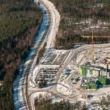The NRC must ensure current levels of safety and performance as nuclear fleet expands
By Anthony R. Pietrangelo, July 3, 2008
The Nuclear Regulatory Commission (NRC) is well-positioned to effectively take on new plant licensing and maintain its oversight of operating plants and its other responsibilities. Organizationally, the NRC created the Office of New Reactors in late 2006–separate from the Office of Nuclear Reactor Regulation–to ensure that its primary responsibility of regulating operating plants wasn’t distracted by new plant licensing. Moving forward, a strong, credible, and efficient regulator is necessary for nuclear energy to play a critical role in fulfilling the nation’s future energy and environmental needs. Let’s examine some of the primary factors that will impact the commission as its workload expands.
The NRC is an independent federal agency with five appointed commissioners and a chairman designated by the president. In my 20 years of experience in dealing with the commission, partisan politics haven’t had a major effect on its decisions. Nuclear safety and security isn’t a partisan issue. Moreover, congressional oversight of the NRC is practiced by representatives from both political parties, and often political considerations have more to do with state and local concerns versus national party affiliation. But let’s not be naïve. The NRC is responsive to congressional inquiries, and although 90 percent of its budget is funded through user fees, its full budget must be authorized by Congress. Over the last few years, Congress has authorized budget increases at the NRC in large part to help it prepare for the review of new plant applications. In the future, the agency must be adequately funded to carry out its statutory mission, but must also be held accountable to execute that mission effectively.
Another primary factor influencing the NRC is the performance of the existing nuclear fleet. Simply put, there would be no applications for new plant licenses if not for the outstanding safety and reliability of currently operating nuclear plants in the United States. This performance has been sustained at roughly 90 percent across the fleet since 2000 and must continue at such high levels in order to demonstrate that the NRC can effectively oversee operating plants and license new plants concurrently. Events at operating plants that effect safety will erode confidence in both the industry and the regulator, which will only have a negative impact on new plant licensing efforts. From an industry perspective, maintaining the high performance of existing plants is the highest priority and a prerequisite to building new ones in the future.
I’ve noted in my previous posts that the NRC needs to continually improve its processes and practices. To that end, I support David Lochbaum’s suggestion that the NRC adopt something similar to the corrective action program (CAP) that all reactor licensees are required to have in place. The CAP is an essential element of licensee efforts to find, assess, and fix problems and issues that are identified in all aspects of plant operations. While the NRC doesn’t run a plant, it does administer a complex enterprise that needs to function effectively to fulfill its mission. A CAP-like effort could help find and address areas that don’t work as intended or designed and could identify trends in performance that would serve the agency well.
I also support Andrew Kadak’s call for the NRC to move forward with more risk-informed, performance-based regulation. Too often, attention and resources get diverted to matters that minimally influence safety in the name of “defense-in-depth” based on traditional, deterministic analysis. Risk assessment is a tool that can help quantify safety margins and the need for additional defense-in-depth measures. The NRC needs to find better ways to employ such tools in its own activities to become a more safety-focused, efficient regulator as its responsibilities grow in the future.
Topics: Nuclear Energy
Share: [addthis tool="addthis_inline_share_toolbox"]














